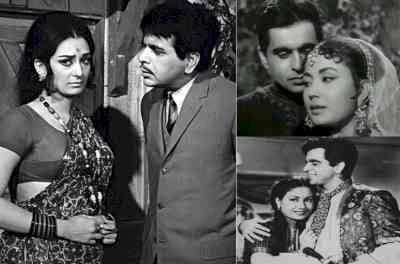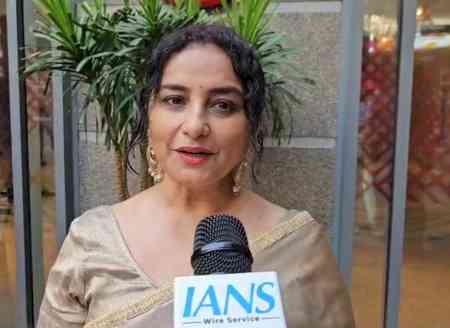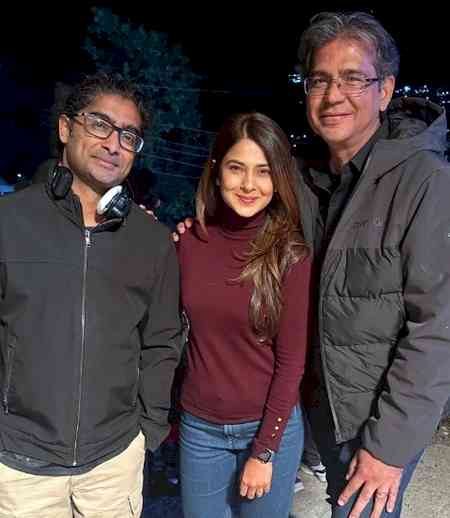The Tragedy King's lesser-known onscreen comic side
Playing a boisterous Bohemian, a debonair prince, or a cheerfully irresponsible student, who intentionally provokes his father and fiancee in a court hearing, a rustic, or a rollicking romantic lead with a swagger that Dev Anand, Shammi Kapoor, and Rajesh Khanna could envy, came natural to him.

VIKAS DATTA
Playing a boisterous Bohemian, a debonair prince, or a cheerfully irresponsible student, who intentionally provokes his father and fiancee in a court hearing, a rustic, or a rollicking romantic lead with a swagger that Dev Anand, Shammi Kapoor, and Rajesh Khanna could envy, came natural to him.
Yet, in popular memory, Dilip Kumar is only synonymous with the dejected, despondent and (usually) doomed hero.
In his 57 films over his half-century-plus stint in the Hindi film industry, Dilip Kumar is chiefly remembered as the 'Tragedy King', battered down by unrequited love, social or political pressure, or other inexorable circumstances.
Whether it was as lush Devdas in the eponymous 1955 film, the unfortunate Prince Marcus of "Yahudi" (1958), the eventually subdued rebellious Prince Salim in "Mughal-e-Azam" (1960), the star-crossed Dilip of "Andaz" (1949), and so on, there was usually no happy ending for him.
In his second phase, where he switched to playing more mature roles, he was usually typecast as the faithful slave of duty and honour, beyond any personal considerations -- the Sanga of "Kranti" (1981), DCP Ashwini Kumar of "Shakti" (1982), Dinanath Saxena of "Mazdoor" (1983), Jailor Vishwanath Pratap Singh of "Karma" (1986), and Thakur Veer Singh of "Saudagar" (1991).
But there was much more to Dilip Kumar's histrionic abilities as mentioned above.
Though he excelled in playing the desperado (as in "Ganga Jumna", 1961) or the don ("Vidhaata", 1982) or even the simple man pushed to vengeance against those who have wronged him (taking on Pran, Prem Chopra and Amrish Puri in "Duniya", 1984), it was the comic streak in which he excelled but rarely got the chance to show his prowess in.
It was in the early 1950s, almost a decade after his entry into films, that Dilip Kumar began worrying about the toll his tragic outings were taking on his psyche, given how he used to immerse himself in the roles. Based on the psychiatrists he consulted in London, he resolved to do some light-hearted parts to lessen his mental burden.
And as the records show, he proved himself to be a natural in this realm as well. Let us look at half-a-dozen of Dilip Kumar's "normal" roles, verging on the comic.
"Aan" (1952): This ground-breaking film was Mehboob Khan's gamble in more ways than one -- not only was this swashbuckling thriller India's first colour film, it had an unusual casting with Dilip Kumar as the merry sword-wielding hero, with the burly Premnath persuaded to abandon his leading roles to become the villain.
Though Mehboob Khan was assailed for "putting a talwar into the hand of the Tragedy King", Dilip Kumar proved his metier in pulling off the different role with aplomb. See him casually chuck off his false beard and moustache and coachman's gown onto the haughty Nadira in "Dil mein chhupa ke pyar ka toofan" for proof.
"Azaad" (1955): This comic crime caper, where Dilip Kumar plays a rich man with a secret alter ego, also represented a casting coup by pitting the 'Tragedy King' against the 'Tragedy Queen; Meena Kumari outside their usual tear-jerker roles. And both sparkled, making the film helmed by S.M. Sriramulu Naidu not only the top hit of the year, but also one of the most successful releases of the 1950s.
Dilip Kumar, who played a Muslim character (Abdul Rahim Khan, though as an onscreen guise) for the first of the total two times in his entire career (the other was in "Mughal-e-Azam"), was at his best in the qawwali "Marna bhi mohabbat mein kisi kaam na aaya".
"Kohinoor" (1960): This "light" costume swashbuckler, by the redoubtable but forgotten director S.U. Sunny, again saw Dilip Kumar paired with Meena Kumari in roles far different from their usual melodrama. It is known for its spellbinding music, especially "Madhuban mein Radhika nache" -- for which Dilip Kumar took special lessons so he could be shown playing the sitar correctly -- and "Do sitaron ka zameen par hai milan aaj ki raat".
It also has a superlatively comic scene in which Dilip Kumar makes the main villain Jeevan, who is drunk, think he is peering into a mirror by mimicking all his facial gestures and contortions. (a copy of the scene was played by Amitabh Bachchan in "Amar Akbar Anthony", when he bandages his mirror reflection).
"Leader" (1964): This film is arguably Dilip Kumar's most stellar comic role. Playing a slightly flippant and irresponsible law student, who purposely needles his family, especially father (Nazir Hussain), and intended fiancee, Vyjayanthimala, he rises to the occasion when he calms down a political rally after a blast, singing "Apni azaadi ko ham hargiz mita sakte nahin".
Though the film is long and winding, with politics, a feudal millieu (Sapru as a maharaja and Jayant as his diwan) and the murder our hero is implicated in, Dilip Kumar leaves a remarkable impression in his setpiece comic scenes. Needling his lady love over phone, he indulges in inept swordplay, sways in a drunken stupor ("Mujhe, duniyawalon, sharabi na samjho"), and above all, the court scene, where cross-examining his father he causes him to loose his temper, and the heroine to break into a flood of tears -- casually handing over a hanky to her.
"Ram aur Shyam" (1967): Playing a double role here, Dilip Kumar is as convincing as the suppressed Ram, kept under the thumb, by his domineering and tyrannical brother-in-law (Pran), as he is as the boisterous, jovial and food-gorging Shyam. When the two exchange situations, as normally happens in such films, Shyam steals the show, whether in the scene where he slaps Ram's prospective -- and equally jovial -- father-in-law (Nazir Hussain) back on his back. or makes eyes and grimaces at Pran, who comes to collect him.
"Sagina" (1974): In this political satire, whose Bengali original he also acted in, Dilip Kumar plays a simple tea estate worker who's propelled out of his league and makes the workers face the wider, much more devious world. The evergreen "Saala main to sahab ban gaya", with veteran Om Prakash, is a highlight.
Then, in shorter examples, are songs such as "Mere pairon mein ghunghroo" in the dark "Sunghursh" (1968), or the in-your-face "Gentleman Gentleman Gentleman" in "Gopi" (1970). A few examples but enough to show Dilip saab strode genres.
(Vikas Datta can be contacted at [email protected])


 IANS
IANS 










